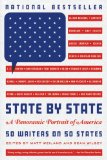Summary | Excerpt | Reviews | Beyond the Book | Readalikes | Genres & Themes | Author Bio

A Panoramic Portrait of America
by Sean Wilsey, Matt Weiland
Carlos's rejection nagged at me all summer, but my civil rights romance was too strong to be snuffed out. The law center was opening satellite offices in the rural counties north of Mobile Bay, and I spent many days doing advance work by way of Greyhound buses to Monroeville and Evergreen. These were some of the poorest places in America. In Monroe County, which, according to the 1980 census, was 43 percent black, median white family income was $17,600 and median black family income was just over $9,000. Conecuh County was even poorer. I interviewed an old woman with a picture on the wall of her shack showing the two Kennedys and King under the words "The Three Who Set Us Free." She didn't seem very free: There was no indoor plumbing in the shack. The revolution of the early sixties had blown through the bigger cities in Alabama and barely touched these piney backwoods. "We get along just fine with our colored folks," the probate judge of Monroe County told me, sounding like a hundred years of predecessors.
I was looking for something—marches, drama, self-sacrifice, community, history—that now existed only in books. Less than two decades before, when Coles was working as a child psychiatrist amid the upheavals of southern desegregation, a young black civil rights worker told him that he'd joined the movement because "I'll be lucky if I can vote, and be treated better than a dog every time I go to register my car, or try for a driving license, or go to buy something in a store." By 1980, what was left of the movement had migrated behind the closed doors of the courts. The law center was involved in several important civil rights suits, including desegregation and voting rights cases against the Mobile school board and county commission, but these were moving slowly, obscurely, through the legal system. Class-action lawsuits were not what I had in mind that summer. I wanted the sight of headlights in my rearview mirror on a rural road. In fact, the Klan still operated in Mobile, as the country learned just a few months later, in March 1981, when two of its members randomly lynched a nineteen-year-old black youth on a city street. (Eventually they were convicted, and one was electrocuted in the first execution of a white man for the murder of a black man in Alabama since 1913. The United Klans of America was later bankrupted by a civil suit that forced the Alabama chapter to turn over its Tuscaloosa meeting hall to the victim's mother, who used the proceeds to buy her first house.) But the main battle for equality in Alabama and the South was over. I had arrived in time for its ambiguous and incomplete aftermath: superficial civility, de facto segregation, economic inequality, with most of the stirring old words gone stale from sloganeering. As Carlos made clear, laws did not change hearts.
The foregoing is excerpted from State by State by Matt Weiland, and Sean Wilsey. All rights reserved. No part of this book may be used or reproduced without written permission from HarperCollins Publishers, 10 East 53rd Street, New York, NY 10022
No pleasure is worth giving up for the sake of two more years in a geriatric home.
Click Here to find out who said this, as well as discovering other famous literary quotes!
Your guide toexceptional books
BookBrowse seeks out and recommends the best in contemporary fiction and nonfiction—books that not only engage and entertain but also deepen our understanding of ourselves and the world around us.